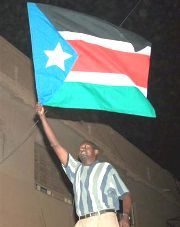Darfur taints Sudanese hopes for new era
By Andrew England, Financial Times
KHARTOUM, Mar 9, 2005 — The multi-coloured flag hanging from the second floor of an office block in Khartoum is one of the few signs in the Sudanese capital that a 21-year civil war has ended.

|
|
A northern Sudanese waves the flag of the SPLM/A in Khartoum after the signing of the first three protocols, on Wednesday May 26, 2004. (AP) . |
The flag was the idea of the Sudan People’s Liberation Army/Movement (SPLA/ SPLM), the southern rebels who in January signed a peace deal with the government. It is intended to represent a “New Sudan”, where all races, religions and ethnic groups are equal.
That SPLA officials were registering members inside their new office also suggested change. Before, “it was difficult to even say you were a SPLM member”, says John Majak, of the SPLA.
Yet while the accord has sparked hopes of a new era, a separate insurgency in Darfur casts a shadow over the country. Violence in the vast region of western Sudan has cost thousands of lives, caused mass suffering and severely dented the Islamic government’s aspirations of being welcomed back into the international community.
Peace dividends that the ruling National Congress party expected – the lifting of US sanctions and assistance to deal with Sudan’s $25bn (?19bn, £13bn) debt – have been put on hold. Now there is the threat that senior party members will be held accountable for what a UN commission has called war crimes and crimes against humanity.
The commission’s findings, released 16 days after the north-south accord was signed, have also created a dilemma for the international community as it seeks to assist an already complex process.
On one hand, western nations want to ensure the southern deal is implemented, which means engaging with the SPLM and a government accused of atrocities. On the other, they have stated their desire to see those responsible for Darfur’s crimes face justice.
Yet the prosecution of government officials could threaten the southern peace accord and complicate efforts to resolve the Darfur crisis.
“It’s one of the most difficult policy debates going on at this time,” says Ted Dagne, an analyst at the US Congressional Research Service. “The US does not want to target the government of unity it spent three years trying to bring together.”
The new government, dominated by the National Congress and the SPLA, is supposed to be in office before July 9.
Ten “high-ranking central government” officials were among 51 people the UN commission listed as crime suspects. None has been named and the list has been sealed while the divided UN Security Council debates what to do next.
The commission urged the Council to refer the cases to the International Criminal Court, but the US favours an ad-hoc tribunal and China is pushing for a Sudan-led process.
Either way an air of uncertainty hangs over Khartoum. “There are lots of pitfalls and dangers. When you move one piece of the chess board you must calculate what will happen to the other pieces,” says one diplomat. “It’s a complicated political game and it’s not always possible to foresee the consequences of every move.”
Another issue is how retrospective justice should be. The southern rebellion is estimated to have caused 2m deaths, and the government was alleged to have employed tactics in the south similar to those of which it now stands accused in Darfur.
The SPLA also allegedly committed abuses. “There’s no completely blameless party in history anywhere in this. What we are trying to do is stop looking in the rear view mirror and look through the windshield to work out what can you do ahead,” says another diplomat.
The US certainly appears to be looking ahead and has just appointed a former ambassador as its new chargé d’affaires for Khartoum, representing the most senior diplomatic presence it has had in Sudan since 1996. It also plans to build a new embassy.
Ending the southern conflict was top of the Bush administration’s Africa agenda. “Those that are saying you can’t have peace without justice are not necessarily wrong, but neither is the other side of the coin – that you can’t have justice without peace,” a US official says. “I think we are going to lean in the direction of pursuing the peace, that’s what’s going to give the population the biggest measure of justice.”
Khartoum so far insists no suspects will be tried outside Sudan. “The international community is doing through ignorance – or it means it – everything it can to make the peace agreement something inconsequential,” says Sayed el-Khatib, director of the government’s Centre for Strategic Studies.
“The people in the ranks of the government who only accepted this because they were steamrollered are going to rear their heads again and say this peace agreement has achieved nothing.”
For Darfuris the debate is another example of what they see as policy U-turns by the international community, says Idris Yousuf Ahmed, a MP from the region. “We are quite upset about what is going on and we really cannot understand all these ups and downs.”
